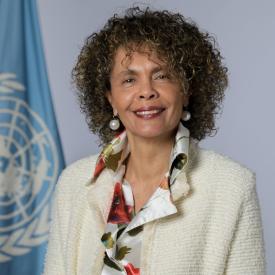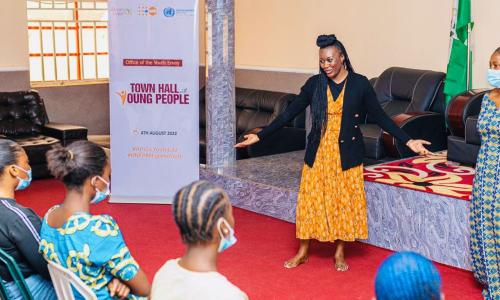The pursuit of reparations has long animated African and global dialogues about justice. Since 1963, when the Organization of African Unity (OAU)—the predecessor to the African Union (AU) — first took up this cause, efforts have been made to advocate for reparations for historical crimes committed against Africans and people of African descent.
These historical crimes included the trans-Atlantic slave trade, colonialism, apartheid, and systemic racial discrimination. Important initiatives have been supported by the AU, from seeking restitution for pillaged cultural artifacts to advancing formal reparation demands at the global level.
Yet, for decades, the conversation has often been relegated to the background, as too often, it is viewed through a narrow financial accounting exercise—it must be deepened, expanded, and, above all, demystified.
The true meaning of reparations in the 21st century cannot be confined to rectifying past wrongs through merely monetary terms. If reparations are framed solely as a historical debt to be paid, without addressing the structural injustices that have persisted and evolved, the conversation risks becoming hollow and ineffective.
We cannot meaningfully repair the past without repairing the present dynamics of Africa’s position within international commerce and multilateralism—systems that continue to apply an extractive mindset to Africa’s people and resources.
The incomplete conversation: Past wrongs vs present wrongs
Reparations are often discussed exclusively in terms of the past: slavery, colonial exploitation, violent occupation, and cultural pillage. These were monumental crimes, and the demand for justice for these wrongs is not negotiable.
However, focusing solely on history without interrogating today’s systemic injustices misses a vital truth: the past wrongs were not buried; they were transformed into today’s economic and political systems.
The structures that enabled colonialism, enslavement, and racial domination have morphed into new forms. Africa remains trapped in a global economic system characterized by the permanent extraction of value through the so-called “commodity trap.”
Ghana exported $9.58 billion in gold in 2024, yet it only retained 14% of the value due to the nature of multinational agreements.
The DRC produces over 70% of the world’s cobalt, yet only 1% is refined in the country before being exported.
Zimbabwe was ranked as the third-largest producer of chromium in 2023, yet most was exported in raw form.
Collectively, West Africa produces 70% of the world’s cacao beans but contributes less than 1% of the global chocolate market.
In Somalia, illegal, unreported and unregulated (IUU) fishing by foreign fishing fleets costs the economy $300 million a year.
Yet, this picture is not limited to raw commodities but extends to financial resources as well.
In this system, Africa is a net creditor to the world, losing more than $500 billion every year through illicit financial flows, unfair trade practices, exploitative investment frameworks, and debt servicing, while it is home to some of the world’s poorest populations.
This reality starkly reveals that today’s wrongs need to be placed in direct relation to yesterday’s crimes. To seek reparations solely for the historical offenses without confronting the ongoing structural injustices is to perform an incomplete act of justice.
Reparations: The 21st Century imperative
The 21st century demands a bold redefinition of what reparations truly mean. Reparations must not be seen merely as financial compensation for past events. They must be understood as a call to transform the very rules of the game—the international trade, finance, and governance systems that have perpetuated injustice for centuries.
Otherwise, a profound contradiction arises: reparations would be paid with Africa’s own stolen wealth.
Thus, reparations must go far beyond any narrow accounting of damages. Financial reparations are necessary but not sufficient. They must be embedded in a comprehensive restructuring of the political, economic, and social frameworks that sustain African underdevelopment and marginalization.
What, then, do true reparations look like in the 21st century?
It is a multi-dimensional project aimed at creating the conditions for dignity, autonomy, and shared prosperity for Africans and people of African descent. It is not just a matter of financial transfers but of systemic transformation:
Justice for the past - through acknowledgment, apology, restitution, and financial compensation where appropriate.
Justice for the present - through dismantling the economic structures that replicate colonial patterns of dependency and exploitation.
Justice for the future - by securing Africa’s rightful place as a co-architect of global governance, development priorities, and economic policy.
True reparations demand:
A re-configuration of global trade systems to end Africa's dependence on raw commodity exports and build competitive, value-added economies.
Transforming the international financial architecture that systematically disadvantages African nations, including ending the "African Premium" that artificially inflates borrowing costs for African nations.
The restitution of African sovereignty over its natural resources, human capital, and policy choices, ensuring that countries have the fiscal space and direct their financial flows to drive their own development decisions.
The end of illicit financial flows and the repatriation of stolen assets by redirecting FDI and ODA to invest in strong institutions and country systems, and above all, digital public infrastructure.
The political will to ensure that Africans and people of African descent have an equal say in shaping the global order by introducing critical reforms in multilateral institutions to ensure equal representation and decision-making.
Addressing historical injustices without uprooting these contemporary injustices would amount to an empty and meaningless conversation.
A call for courage and clarity
The African Union’s 2025 theme provides a historic opportunity, but only if it is approached with uncompromising courage, clarity, and a focus on both past and present wrongs.
We must demystify the conversation.
Reparations are not merely about the past; they are about the structures that continue to disadvantage Africa today. The past has not ended, it has evolved. And unless we repair today’s wrongs, there will be no true justice for yesterday’s crimes.
Africa must lead this conversation, not with a hand outstretched for compensation, but with a demand for systemic economic justice.
Reparations are not about charity; they are about fairness, restitution, and the right to define a future unshackled from the legacies of exploitation.
The world must be prepared not just to listen, but to act upon this bold and necessary call.
Ms. Duarte is Under-Secretary-General and Special Adviser on Africa to the UN Secretary-General.








